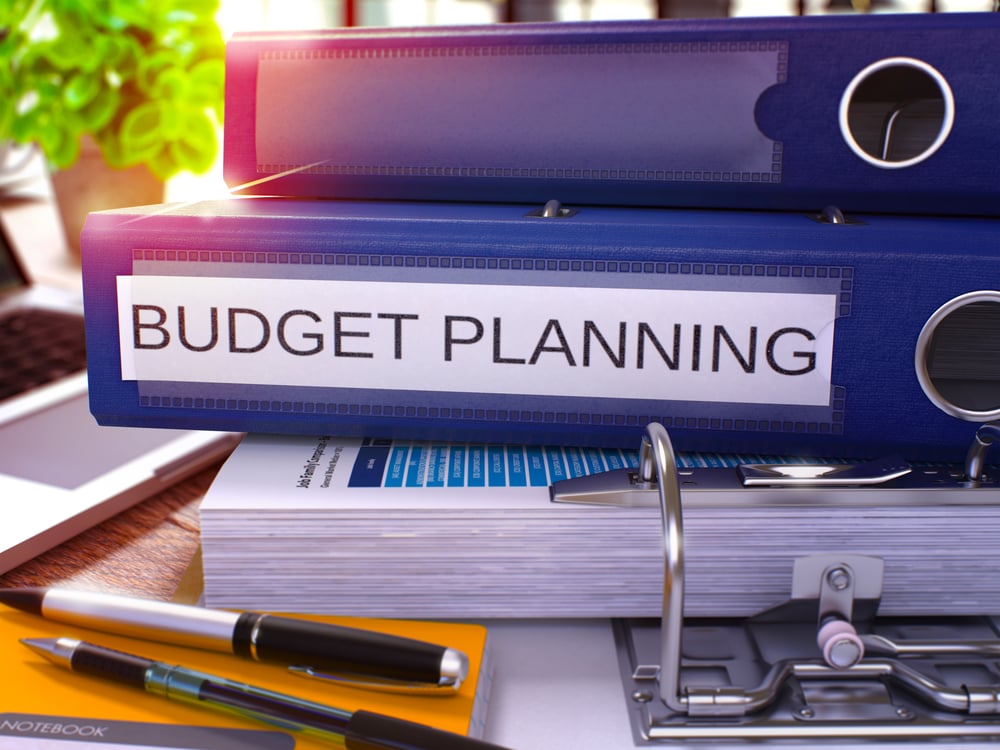Military Budgeting & Savings Tips
The military presents a unique set of challenges that can often seem overwhelming. This goes beyond serving your country; it also has to do with financial preparation. How can you make the most of your pay, save for the future, and still enjoy life today?
In this post, we’ll explore twelve creative strategies for budgeting and saving while in the military. Whether you are just starting out in your career or have been in the military for many years, these tips will help you reach your long-term financial goals without breaking a sweat!
Ready to get going?
Let's begin!
 Image from Canva
Image from Canva
Active Duty Budgeting Tips
If you're on active duty, you can take advantage of the many budgeting opportunities that many service members often overlook. Let's discuss some common budgeting tips for active duty military to help get you started.
1. Track Your Expenses
The first step to creating a budget is to track your expenses. This will give you a clear picture of where your money is going and where you can cut back.
There are many ways to track your expenses, but one of the simplest methods is to use a pen and paper or an Excel spreadsheet. Simply write down everything you spend for one month, and then categorize your expenses. This will help you to see which areas of your budget are the most expensive.
If you're not so old school, you may opt to use the many available smartphone apps or online tools to assist with this process.
Create a Budget
Once you’ve tracked your expenses and have a solid understanding of your finances, it's time to create a budget. A budget is simply a plan for how you will spend your money each month.
When creating a budget, be sure to include your fixed expenses (such as rent or mortgage, car payments, insurance premiums, etc.) as well as your variable expenses (such as food, gas, entertainment, etc.). Once you have all of your expenses accounted for, you can begin to allocate your funds.
A good rule of thumb is the 50/30/20 rule, which suggests that you should spend 50% of your income on essential expenses, 30% on non-essential but important expenses, and 20% on savings and debt repayment.
Of course, this is just a guideline— you may need to adjust the percentages based on your unique financial situation.
 Image from Canva
Image from Canva
2. Get Rid of Your Debt
If you're carrying any debt, now is the time to get rid of it. Debt can be a major drag on your finances, and it's important to get rid of it as soon as possible.
There are a few different strategies you can use to pay off your debt. The "debt snowball" method involves paying off your smallest debts first, while the "debt avalanche" method involves paying off your debts with the highest interest rates first.
Whichever method you choose, be sure to make more than the minimum payments each month to accelerate the process. You may also want to consider transferring your debt to a 0% APR credit card so you can save on interest.
Once you're debt-free, you'll be in a much better financial position and will be able to start saving for other goals like real estate investment, retirement, or a college fund for your children.
 Image from Canva
Image from Canva
3. Build an Emergency Fund
An emergency fund is a crucial part of any financial plan. This is money that you set aside in case of an unexpected event, such as a job loss, medical emergency, or car repair.
Ideally, your emergency fund should have enough money to cover three to six months of living expenses. However, if you're just starting out, you may want to aim for a smaller goal, such as $500 or $1000.
Once you've built up your emergency fund, be sure to keep it in a savings account so you can easily access it if needed. However, if you are disciplined enough, you may want to consider investing this money so it can grow over time.
Remember, an emergency fund is for emergencies only – don't be tempted to dip into it for non-essential purchases!
4. Pay Your Bills on Autopilot
One of the best ways to stay on top of your finances is to set up automatic bill payments. This way, you'll never have to worry about missing a payment or being late on a bill.
Most banks and credit unions offer this service for free, so there's no excuse not to take advantage of it. Simply log into your online banking account and set up automatic payments for all of your recurring bills.
If you have a hard time remembering to log into your online banking account, you may want to consider setting up alerts. That way, you'll get a text or email notification whenever a bill is due.
You can do the same thing for your savings and investment accounts.
5. Take Advantage of Military Benefits
One of the most underutilized strategies for budgeting and saving while in the military is taking advantage of military benefits.
There are a number of programs and discounts available to military members, and many of them can save you a lot of money. For example, the Military Housing Assistance Program offers interest-free loans to help with the purchase of a home.
There are also discounts on everything from cell phone plans to car insurance. Be sure to do your research and take advantage of all the benefits you're entitled to.
Here are a few more options:
- GI Bill (Chapter 31 or 33)
- Housing Allowance (BAH)
- Disability
- Inexpensive Life Insurance
- Low-Cost Retirement Plan
- VA Home Loan
These are advantages that you've earned by serving your country, and they can help you earn or save money while cutting expenses. Take advantage!
6. Pay Yourself First
One of the best pieces of advice for budgeting and saving in the military is to "pay yourself first." This means that you should automatically transfer a fixed percentage of your income into savings before you start paying bills or making other purchases.
For example, if you know you need to save $500 per month, you would first transfer that $500 into your savings account before paying any other bills. This way, you're less likely to spend the money on non-essentials.
If you're not sure how much you should be saving each month, start with a small goal and increase it over time. You may also want to consider automating your savings, so you don't have to think about it.
.png?width=900&name=savings%20account%20(1).png) Image from Shutterstock
Image from Shutterstock
Saving Tips for Service Members
Okay, now that we've tackled budgeting, here are a few savings tips that are specific to service members.
7. Eat in the Dining Facility
One of the best ways to save money while in the military is to eat in the DFAC or Chow Hall. Assuming you live in the barracks or dorms, this food is paid for by your tax dollars, so you might as well take advantage of it.
Even if you live off base, it’s relatively cheap to eat at the dining facility. Plus, you need to be on base for work anyway.
Not only is this a great way to save money, but it's also a great way to meet new people and socialize.
 Image via army.mil, Public Domain
Image via army.mil, Public Domain
8. Ask for Military Discounts
Whenever you make a purchase, be sure to ask if there is a military discount available. You'd be surprised how many businesses offer discounts to service members.
Some of the most common discounts include restaurants, hotels, car rentals, and retail stores. But there are also discounts on things like movie tickets, gym memberships, and amusement park tickets.
All you have to do is ask, so be sure to take advantage of this perk.
 Image from Canva
Image from Canva
9. Shop on Base
Another great way to save money is to shop on base. The exchange and commissary offer a wide variety of items at discounted prices. And, you don't have to pay sales tax on any of your purchases.
So, whether you're looking for groceries, clothes, or household items, be sure to check out your local base exchange and commissary. You'll save a lot of money in the long run.
10. Press Your Own Uniforms
One of the biggest expenses for service members is the cost of uniforms. But, you can save a lot of money by pressing your own uniforms. All you need is an iron and ironing board. Plus, it's a great way to relax after a long day.
There are also a number of other ways to save on uniforms, such as buying them used or renting them from a uniform service. Whatever you do, just be sure to budget for this expense.
 Photo from www.af.mil media
Photo from www.af.mil media
11. Focus on Free or Inexpensive Social Activities
There are a number of social activities that are either free or inexpensive. For example, you can go for a walk, read a book, or play sports. You can also visit a museum, go to the movies, or attend a concert.
The key is to find activities that you enjoy and that don't cost a lot of money. This way, you can still have fun without breaking the bank.
12. Advance Your Career
The last tip we have about budgeting and saving while in the military is simple, and it serves two purposes. First, it will help you save money. And second, it will help you advance your career.
The best way to do this is to take advantage of the training and benefits that are available to you. This will make you more marketable and could lead to higher pay by actively seeking promotion. The pay increase from E-3 to E-4 is either $232 or $469, depending on your years of service.
That amount can go a long way towards meeting your financial goals.
Final Thoughts
So, there you have it, 12 unique strategies for budgeting and saving while in the military. Budgeting doesn't have to be difficult or boring. And with these tips, you can reach your financial goals in no time.
Now get out there, implement them, and reap the rewards for years to come!
About the author: Ron Tuch is an Army veteran, full-time blogger, professional copywriter, digital nomad, and digital marketing expert. He is the founder and content strategist behind Redpillrebellion.com. Join him in his quest to empower others to find an alternative path to freedom and ditch societal thinking through the power of internet marketing. With 7 years of blogging experience, he has helped countless others achieve their dream of building a profitable blog online. When he’s not sharing his experience with MilitaryByOwner readers, you can find him exploring the four corners of the globe on a quest to find the best beaches, food, and culture that life has to offer.







